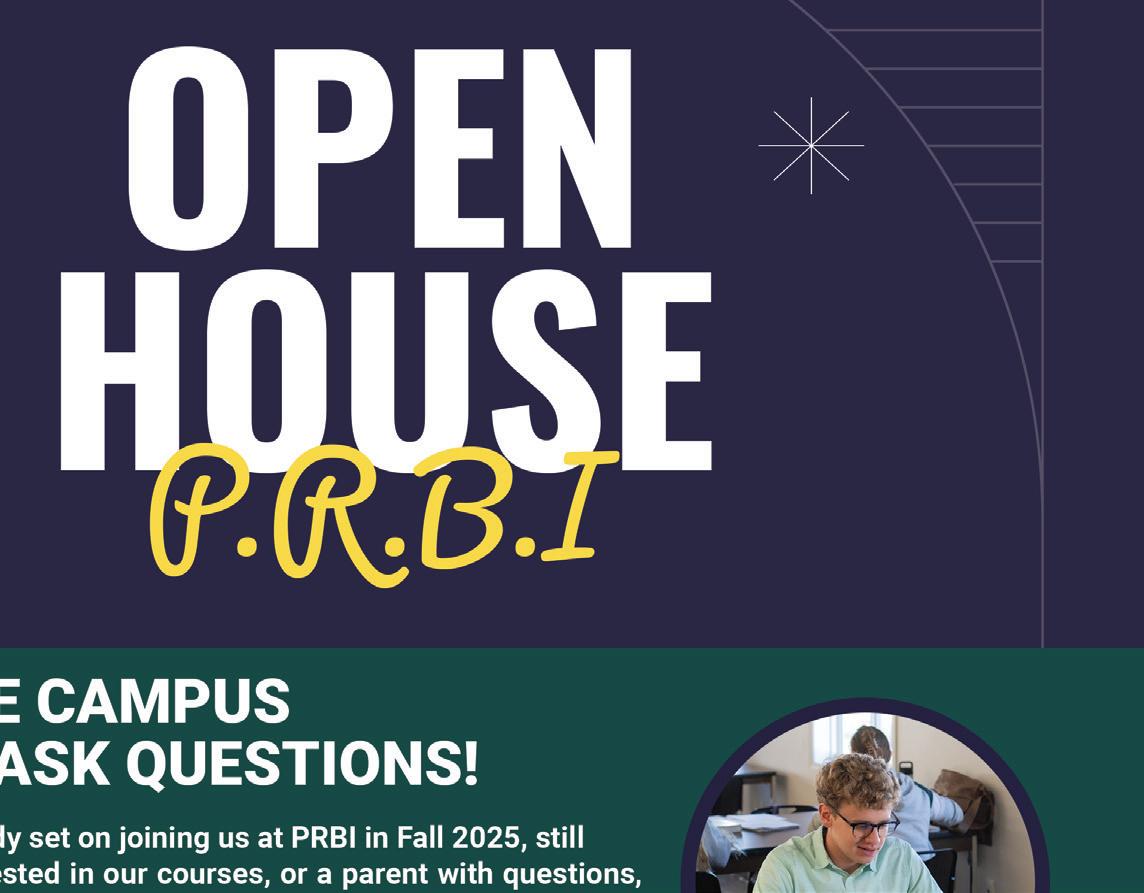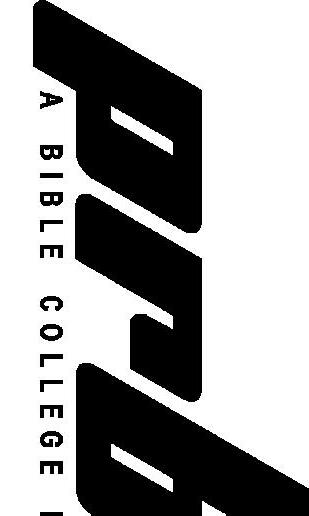Summer Trumpet2025 Trumpet
What Has Changed? What Has Not.
Recently, a student walked into my office and asked a thoughtful and pointed question: “What has changed under your time as President?”
It is a good question, and one that gave me pause.
I was appointed President of PRBI in August 2019. It was not long before the landscape of post-secondary education, and indeed our entire world, shifted dramatically with the arrival of COVID-19 in March 2020. Like many institutions, we experienced a season of challenge. Enrolment declined. Staff numbers were reduced. Hard decisions were made.
But as I sat with that student, what
rose to the surface was not just what has changed, but what has not.
In a world that moves faster than ever, filled with shifting values and changing expectations, I am grateful to say that the core commitments of PRBI remain the same. If anything, they have become even more focused and essential. Our leadership continues to be anchored in the values that shaped this college from the beginning. Here is what still defines us today:
Holding Forth the Word of Life
Our motto, “Holding Forth the Word of Life,” is more than a legacy phrase, it is a living commitment. The Bible is not just in our name; it is the foundation for all that we do. Whether in the classroom, chapel,
Kim Cairns President
dorm, or discipleship group, the Word of God remains central. We want our students to know Scripture, to be transformed by it, and to live it out with conviction and courage.
In a culture where truth often feels negotiable, we remain committed to upholding God’s unchanging truth with clarity, humility, and boldness.
Committed to Quality Academics
A vital aspect of discipleship is wholeheartedly loving God, engaging our minds fully in the Christian journey. Therefore, PRBI’s curriculum includes strong academic training in the Bible and theology, applied ministry, and general studies. We want students to not only know what they believe but also why they believe it, and to be able to articulate
that in a way that engages the world around them.
While technology and course delivery methods have evolved, our commitment to rigorous, Christcentred academics has not wavered. We continue to train students to think deeply and biblically about their faith, culture, and calling.
Committed to Disciple-Making
At PRBI, we do not simply teach about discipleship; we live it. Our model is Jesus Himself. We invite students to encounter Christ, to be with Him, to become like Him, and to do what He did. This process is not limited to the classroom; it extends into every part of campus life.
Students are mentored one-on-
one, engaged in small groups, and immersed in a community where spiritual formation is intentional and personal. It is our prayer that every student who comes to PRBI would grow into a lifelong disciple-maker, shaped by time with Jesus and eager to invest in others.
Committed to Community Life
In our experience, deep spiritual growth frequently occurs within the context of meaningful relationships. Most of our students live on campus, and residence life is a vital part of their formation. In the shared rhythms of meals, study, laughter, and prayer, students develop friendships that last a lifetime.
Community at PRBI is more than a buzzword. It is a way of life. We walk together through joy and sorrow, success and failure, growing into the likeness of Christ as we learn to love one another well.
Committed to Training Workers for the Harvest
From the beginning, PRBI has held to its mission: “…the training of students
to become ministers, whether at home or abroad.” That calling remains as relevant today as ever. Our students are preparing to serve as pastors, missionaries, counsellors, worship leaders, youth workers, and faithful church members.
Whether God calls our students to vocational ministry or to serve in the workplace or community, we are equipping them to lead with character, competence, and a heart for the Gospel. We are preparing our students to be productive workers in God’s kingdom.
Yes, some things have changed. We have adapted, innovated, and responded to the challenges of our time. But the heart of PRBI beats with the same rhythm it always has, a rhythm shaped by the Word, grounded in Christ, and lived out in community and mission.
I am grateful for that student’s question. And I am even more grateful for the privilege of helping to steward a school that continues to hold fast to what matters most!
This
Wednesdays 7:00 pm to 8:30 pm This course
Friday, November 21 at 7 pm
Sunday, November 23 at 2 pm
College News
Reflecting back on our school year, we are grateful for all that God has done. We’ve seen His faithfulness through changed lives, growing students, and generous provision. Graduation interviews with our fourth-year students were encouraging—they reflected deep theological formation, strong community bonds in dorm life, and personal spiritual growth. Some even shared how PRBI helped solidify their faith in Christ during challenging seasons. Two graduates are heading into full-time ministry, with others discerning next steps in church and para-church roles. These testimonies affirm the heart of our mission and remind us that God continues to use PRBI as a place of calling, equipping, and transformation.
We celebrated 24 graduates across our ACS, BBS, and BRE programs, along with three certificate recipients from our Foundations, Reach, and Faith-Based Addictions Treatment tracks. Looking ahead, 31 students have indicated plans to return this fall, giving us an encouraging 80% retention rate at this stage. We currently have 27 accepted freshmen and are seeing encouraging results through earlier, more direct conversations about applying. As always, we anticipate final numbers
Jeremy Johnston Vice President
to be confirmed in early September.
Our Reach mission team returned safely from Brazil after a meaningful partnership with Operation Mobilization. Students engaged in cross-cultural ministry and witnessed God’s work in vibrant local churches and communities. Next year, we’re excited to offer similar opportunities with OM in Romania and Spain, continuing our emphasis on missions and global awareness.
Our faculty are actively engaging with developments in artificial intelligence, participating in research and dialogue to better understand how AI is impacting education. May God grant us the wisdom to manage this situation.
Financially, donations remain strong, and we’re on track to meet our annual targets. Several campus improvements are underway, including office renovations, foyer upgrades, and key infrastructure repairs. Our annual capital campaign has raised $47,370 toward a $200,000 goal.
We are grateful for how God continues to work in and through PRBI. Thank you for your partnership in this ministry.
Beginnings
It is 8:00 am, Tuesday morning, September 10th of last year. There are 26 pairs of eyes on me. I have never taught a college course before, but for the next 75 minutes that is exactly what I will be doing, for the first time. Adrenaline pumping, I am hyper-aware of every hand raised, every bit of eye contact, every smile or frown. Having overthought my way through the class period, I arrive back at my office spent. Despite any lingering fatigue, I have another class in 90 minutes. The day rushes by.
I find myself ruminating on beginnings these days. As I write this, we have just completed the 2024/25 academic year at PRBI. My freshman year as a faculty member is behind me and it has certainly been a year of firsts: first week of classes, first cohort of students, and first marking of assignments. First experiences
have a way of imprinting themselves in our memory.
A ministry first that also left its mark came while serving as a youth pastor at Knox Evangelical Free Church. For 11 years in Edmonton, I took our youth group to Youth Conference (YC), but my most vivid memories are of the first trip. I was stressed. My wife, Tabitha, said my left eyebrow twitched for a month. I was glad for every opportunity to help the teens of our church encounter Christ, but we do not leave these experiences, especially the first ones, unmarked.
One of my first classes to teach last semester was Old Testament I, covering the books of the Bible from Genesis to Deuteronomy. Our proposition in teaching this portion of Scripture is that the promise made to Abraham guaranteeing progeny, position, and possession
Tyler Hanson Faculty
serves as the central concern of the whole text. This concern comes most dramatically into focus in Abraham’s life with the birth and potential sacrifice of Isaac.
Genesis 21 explicitly describes the birth of Isaac as an expression of God’s intervention: “the Lord was gracious to Sarah,” “the Lord did for Sarah what he had promised,” “at the very time God had promised,” “as God commanded him.” Compared with the spartan account of Ishmael’s birth, Isaac’s entry into the family elicits great fanfare. He is God’s expected provision.
Yet the birth places Abraham in a bind. Will the heir be Ishmael or Isaac? Will he lean into the fulfilment of God’s promise? Will he respond in faith or fear? Abraham is on the horns of a dilemma. Abraham has two sons. Ishmael, the child of Hagar,
represents Abraham and Sarah’s scheming to receive divine blessing without reliance on the divine. This is a recurring motif in the patriarch’s life: Abraham can manufacture his own solution or take a step of faith and rely on God’s strategy. It is easy to spot his mistakes in the pages of Scripture but the juxtaposition between the sure bet of doing things his way versus the uncertainty of obeying God’s instructions is significant. Perhaps Abraham’s eyebrow was twitching.
Thankfully, we are nearing the climax of Abraham’s faith journey and so despite being born second, Abraham declares Isaac the inheritor. He is now the one on whom Abraham’s legacy rests. Isaac will leave his distinctive mark on Abraham, both at his birth and later. He is a kind of firstborn of faith for Abraham and that cannot fail to leave an impression.
Later, at least in Isaac’s late teens, we are told, “God tested Abraham” (Ge. 22:1). This statement is made to alleviate our horror at the situation— but should it? Walking through this passage with my class, I could tell the students were really engaging the text when they started to squirm in their seats. “Take your son, your only son, whom you love—Isaac—and go to the region of Moriah. Sacrifice him there…” (Ge. 22:2). The precise wording makes clear the intentional incongruity of the command: destroy that which was promised. Abraham does not get the information we do as readers. He does not know this is a test.
In the manner of Hebrew storytelling, Genesis gives us no window into Abraham’s inner struggle. Hebrews 11 gives us the only hint to what is going through Abraham’s mind as his little party makes its way through the wilderness to Mt. Moriah. “Abraham reasoned that God could even raise the dead, and so in a manner of speaking he did receive Isaac back from death.” Temptations are prolific. Some even cloak themselves in virtue. Yet Abraham is singled out for one thing: faith.
It is the quality of Abraham’s faith that astonishes us. How can he make this desperate leap? But that famous question characterizes Abraham poorly. This is neither a leap of faith nor is it blind faith. Did you catch how
the author of Hebrews describes the situation? “Abraham reasoned.” His is a reasonable faith. If God truly is omnipotent and omniscient, is it not reasonable that He can fashion better plans than ours? If God is truly our benevolent Father, is it not reasonable that His plans will turn out “for the good of those who love him, who have been called according to his purpose?” (Ro. 8:28)
My Christian Apologetics students are likely tired of hearing my assertion that we too have a reasonable faith. Like Abraham, we are to exercise our faith in a manner that fulfils that greatest command: “Love the Lord your God with all your… mind” (Mk 12:30). Every beginning is a venture into the unknown, an act of faith.
Whether in a new place with ministry, family, or school, we, like Abraham, can step forward in the reasonable expectation of experiencing afresh God’s goodness and provision. Sometimes hindsight gives us focus: have you found yourself in a situation in the last year that has tested your faith? In what ways has God called you to follow His plan instead of your own?
Tyler is an alumnus of PRBI (19992003) and has served as PRBI faculty since 2024. Tyler and his wife, Tabitha have five boys.
SEPTEMBER 10
SEPTEMBER 17
Peace River Bible Institute is recognized as a degree-granting Bible College by the Province of Alberta. Building on Christ as our foundation, PRBI values Biblical Training, Authentic Relationships, Kingdom Service, and Strategic Partnerships. Our vision is that every student encounters Christ in ways that transform their life, energize their church, and impact their world. We are a Bible College for Life! For more information on our Mission, Vision, and Values, go to www.prbi.edu.
You can also give online at
You can also give online at www.prbi.edu/give or to etransfer visit
for more information.
The TRUMPET is the magazine of Peace River Bible Institute. It is comprised of contributions from faculty, staff, alumni,
students who are passionate about making disciples in their churches and
email us at
Printed in Canada.
you can now give via etransfer. Visit www.prbi.edu/etransfer for more info.







































